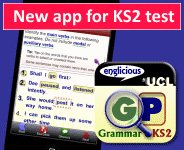Topics: Grammar and meaning and Modal verb or Connective
Grammar and meaning
These resources consider how grammar is important in expressing certain types of meaning.
Modal verb
Explanation
A modal verb is an auxiliary verb which expresses modality (meanings to do with what is possible, necessary, and so on).
Modal verbs are used to change the meaning of other verbs...
Connective
Explanation
'Connective' is an old term that has been widely used by teachers for words that can connect units of information in various ways...
Englicious contains many resources for English language in schools, but the vast majority of them require you to register and log in first. For more information, see What is Englicious?

